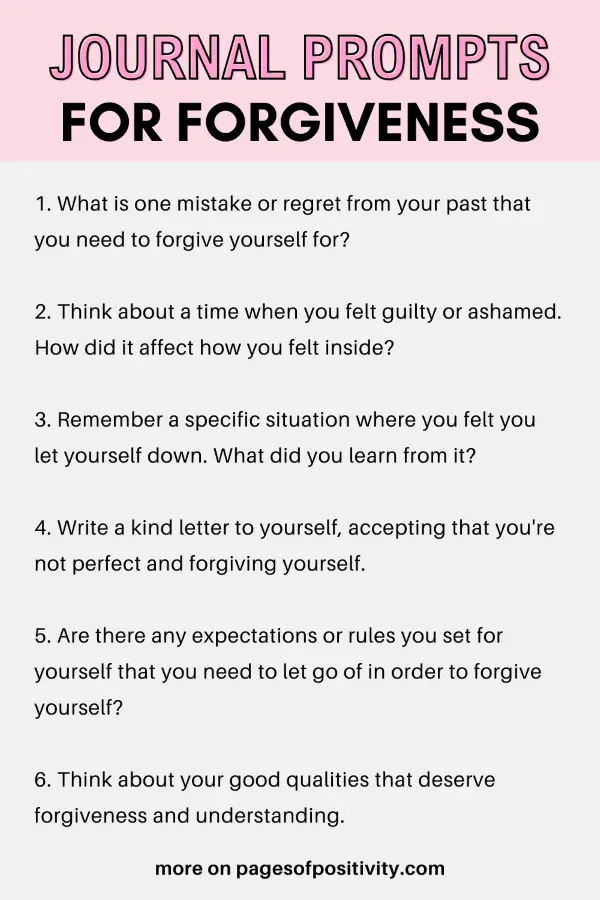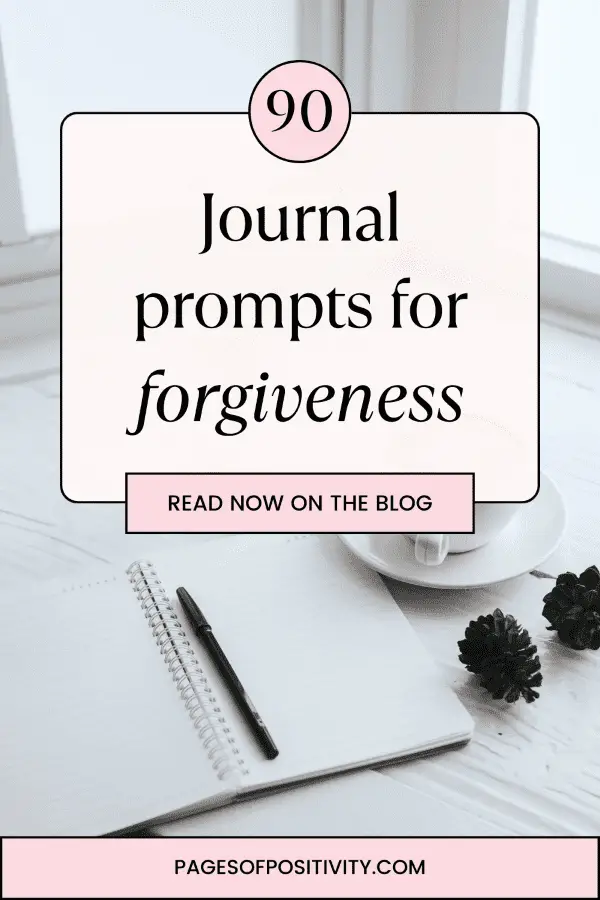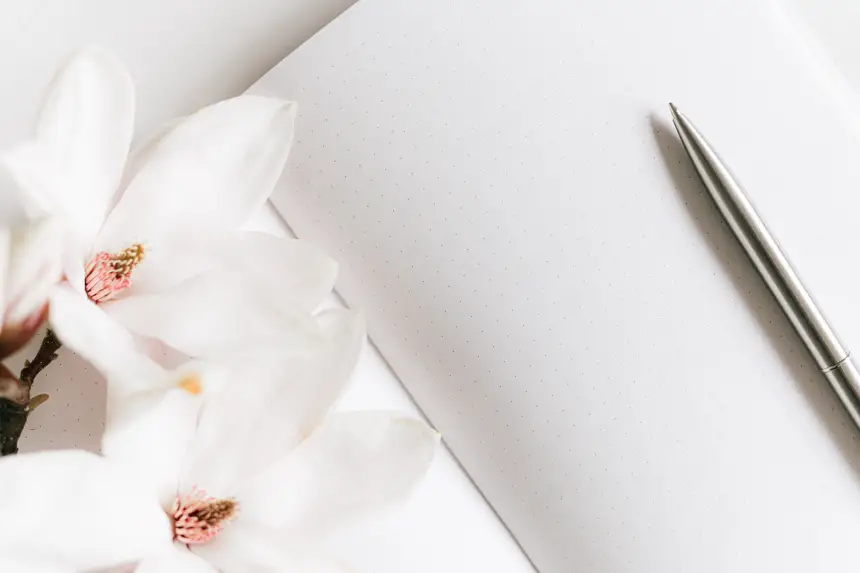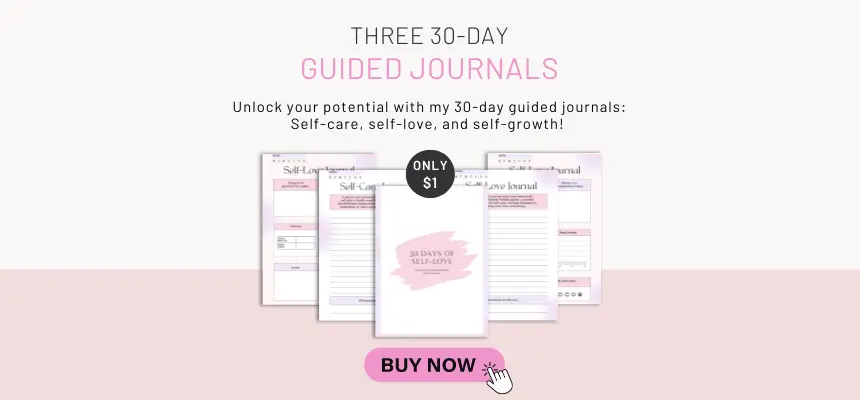My favorite shadow work prompts for forgiveness
Today we’re talking about forgiveness journal prompts.
Yes, I thought it’s finally time to talk about something really important: forgiveness. In our busy lives, it can be hard to forgive others or even ourselves.
But don’t worry!
With the help of journaling, we can discover the amazing power of forgiveness. All you need is a notebook and a pen, and we can start our journey toward forgiveness together.
Now let’s move on to my favorite forgiveness writing exercises.


This post may contain affiliate links. That is, if you click on a link and buy something I recommend, I will receive a small compensation at no additional cost to you.
90 journal prompts for forgiveness
30 journal prompts for self-forgiveness
- What is one mistake or regret from your past that you need to forgive yourself for?
- Think about a time when you felt guilty or ashamed. How did it affect how you felt inside?
- Remember a specific situation where you felt you let yourself down. What did you learn from it?
- Write a kind letter to yourself, accepting that you’re not perfect and forgiving yourself.
- Are there any expectations or rules you set for yourself that you need to let go of in order to forgive yourself?
- How has blaming yourself stopped you from moving forward in life?
- Describe the things you can do to be kind to yourself and love yourself as you forgive yourself.
- Write about a time when you made a mistake without meaning to hurt anyone. How can you make peace with yourself?
- Think about why you keep making the same mistakes. How can forgiveness help you break this pattern?
- Reflect on the times when you’ve been too hard on yourself. How can you replace judgment with acceptance?
- Write about a moment when you disappointed someone else. How can you forgive yourself and try to make things better, if you can?
- Think about your good qualities that deserve forgiveness and understanding.
- How has forgiving yourself helped you set healthy boundaries in your relationships?
- Write positive things about yourself that can help you forgive and be kind to yourself.
- What can you do every day to take care of yourself and forgive yourself?

- Reflect on the times when you didn’t believe in your worth. How can forgiveness help you feel better about yourself?
- Describe a situation where you didn’t take care of yourself. How can you forgive yourself for that?
- Write about a time when you made a decision because you were scared or unsure. How can you forgive yourself for not knowing better at that time?
- Think about any lingering anger or resentment toward yourself. How can forgiveness bring healing and let go of those feelings?
- Write a letter to your younger self, being forgiving, understanding, and encouraging.
- Describe how forgiving yourself can make you feel mentally, emotionally, and physically better.
- Reflect on the progress you’ve made in growing as a person. How can you forgive yourself and celebrate your growth?
- Write about a mistake or failure that taught you something important. How can you forgive yourself for that and appreciate what you learned?
- Think about any beliefs that hold you back. How can you let them go through forgiving yourself?
- Describe a time when someone forgave you. How can you give yourself that same forgiveness?
- Reflect on how forgiving yourself helps you become stronger, and accept that everyone makes mistakes.
- Write a saying or phrase that reminds you to forgive yourself on your journey to self-forgiveness.
- Think about the connection between forgiving yourself and trusting yourself. How can forgiving yourself help you trust your decisions and actions?
- Describe the things you can do to be kind and forgiving to yourself during tough times or when you doubt yourself.
- Reflect on how forgiving yourself can help you change and become better. How can you use self-forgiveness to create a brighter future?
You might also like: Do some self-reflection with journal prompts for setting healthy boundaries
30 forgiveness writing prompts to forgive others
- Think about someone who has hurt you. How has holding onto anger affected how you feel?
- Write a letter to the person you need to forgive, expressing your thoughts and feelings without being mean.
- Try to understand why the person who hurt you acted that way. Can you see things from their point of view?
- Describe how forgiving can free you from the weight of anger and resentment.
- Think about any beliefs that make it hard for you to forgive. How can you let go of them?
- Write about a time when someone forgave you and how it made things better. How can you forgive others like that?
- Think about any misunderstandings that may have caused the hurt. How can clearing things up help with forgiveness?
- Write about the things you can learn or how you can grow from forgiving others.
- Think about the power dynamics of the situation. How can forgiving help you feel stronger?
- Describe the things you can do to feel empathy and kindness toward the person you want to forgive.
- Write about how holding onto grudges affects your relationships and how you feel.
- Think about any fears or worries that stop you from forgiving others. How can you overcome them?
- Reflect on how we’re all humans and make mistakes. How can understanding this help with forgiveness?
- Write down good things about the person you want to forgive. How can focusing on these things help with forgiveness?
- Describe how you feel when you think about forgiving the person. How can you deal with those feelings?
You might also like: My favorite journal prompts for love and nurturing relationships
- Think about how forgiveness can break the cycle of hurt and make relationships healthier.
- Write a saying or phrase that reminds you to forgive as a way to move forward.
- Explore the idea of setting boundaries and taking care of yourself while forgiving others.
- Describe the good things that can happen when you forgive, like feeling more peaceful and growing as a person.
- Reflect on times when others have forgiven you. How can you forgive those who hurt you like that?
- Think about a situation where forgiving yourself would be an act of love and freedom.
- Understand that forgiveness takes time, and it’s okay to go through a process. Give yourself the space to navigate this journey.
- Describe how forgiveness can help build trust and make relationships healthier.
- Think about any expectations from society or your culture that affect how you see forgiveness. How can you define forgiveness in your own way?
- Write a letter forgiving the person who hurt you, even if you don’t plan to send it. Use this to let go of your feelings.
- Explore how forgiving others can help you grow as a person.
- Describe the steps you can take to let go of negative feelings and create room for healing.
- Think about anything positive or thankful you can find in the situation, even if it’s hard. How can focusing on these things help with forgiveness?
- Write about how forgiving can have a positive impact not only on you but also on others around you.
- Explore the idea of radical forgiveness—forgiving without needing an apology or change from the other person. How can you practice this type of forgiveness?

30 forgiveness journal prompts to understand forgiveness
- What does forgiveness mean to you personally? How has your definition changed over time?
- Think about a time when you saw or experienced forgiveness. How did it affect you?
- Explore how forgiveness and compassion are connected. How do they relate to each other?
- Write about any misunderstandings or beliefs you had about forgiveness. How have your thoughts changed?
- Reflect on how forgiveness benefits your mental, emotional, and physical well-being.
- Describe a situation where forgiving someone feels difficult. What makes it hard?
- Explore how self-forgiveness is related to forgiveness as a whole. How are they connected?
- Write about a cultural or religious view on forgiveness that you relate to. How does it shape your understanding?
- Reflect on any fears or doubts you have about forgiveness. How can you overcome them?
- Describe the difference between forgiveness and reconciliation. How can you navigate these concepts in your life?
- Explore the idea that forgiveness is a choice, not something you have to do. How does this make you feel more empowered?
- Write about a time when forgiveness transformed a relationship or situation for you. How did it impact everyone involved?
- Reflect on the boundaries you may need to set when forgiving others. How can you prioritize your own well-being?
- Describe the emotions that come up when you think about forgiving someone. How can you handle these emotions?
- Explore how forgiveness contributes to personal growth. How does it help you evolve and change?

- Write about how forgiveness can bring healing. How does it provide closure and release?
- Reflect on the idea that forgiveness is a process, not just a one-time thing. How can you give yourself time and space for this process?
- Describe any rituals or practices that can support your forgiveness journey. How do they help you forgive?
- Explore the idea of forgiving without forgetting. How can you acknowledge your experiences while still forgiving?
- Write about the role of empathy in forgiveness. How can you understand those who have hurt you?
- Reflect on how forgiveness impacts your relationships with others. How does it affect the way you connect with them?
- Describe how forgiveness brings inner peace and harmony within yourself.
- Explore forgiveness as a gift to yourself. How does it free you from anger and resentment?
- Write about how forgiveness connects to personal responsibility. How can you hold yourself accountable while forgiving others?
- Reflect on any resistance you have to forgiving certain people or situations. What causes this resistance?
- Describe the lessons you have learned from past experiences of forgiveness. How have they shaped your understanding?
- Explore forgiveness as an act of self-love and self-care. How can you prioritize your well-being while forgiving?
- Write about how forgiveness breaks cycles of hurt and improves relationships.
- Reflect on how culture and society influence your understanding of forgiveness. How can you develop your own understanding?
- Describe how forgiveness can be a continuous practice in your life. How can you practice forgiveness in your daily life?

FAQ: What’s journaling?
Picture this: you’re sitting in a cozy corner of your favorite café, enjoying a delicious cup of coffee that fills the air with its wonderful aroma.
Suddenly, an amazing idea pops into your head. You quickly grab your journal and start writing down all your thoughts on the blank pages.
In that moment, you realize just how powerful journaling can be. It’s a way to capture your deepest thoughts, feelings, and experiences in a tangible way.
Think of journaling as a warm, genuine chat with your inner self. It’s your safe haven, a space where you can be utterly authentic and share your true self, free from the burden of concern about others’ opinions.
Imagine it as a personal time capsule where you can document your happiest moments, the challenges you’ve overcome, and the dreams and goals you have for the future.
When you put your thoughts on paper, you create a special space for self-discovery and reflection.
But journaling is more than just writing down daily events or jotting down to-do lists. It’s about delving deeper into your emotions, exploring your thoughts, and gaining a better understanding of who you are.
It’s a journey of self-exploration and self-expression that allows you to tap into your inner wisdom and unleash your creativity.
One of the great things about journaling is that you can do it in many different ways. It’s a personal practice that you can make your own.
Some people like to follow specific journal prompt ideas to give them direction. Others prefer to just write whatever comes to mind.
You can try different techniques to see what you enjoy. For example, gratitude journaling is when you write about the things you’re thankful for.
Dream journaling is when you write down your dreams and think about what they mean. And if you like being creative, visual journaling lets you add drawings, photos, or collages to your journal.
You might also like: Do some self-reflection with journal prompts for trust issues
FAQ: What are the benefits of journaling?
Before we talk about forgiveness journal prompts, we have to talk about the benefits of using journaling prompts as part of your journaling routine.
One of the best things about journaling is how it can help us feel less stressed and improve our mental health. When we write down our thoughts, fears, and worries, it can make us feel better and give us a chance to think about things.
It’s like letting go of our worries and finding a sense of calm. Journaling can be a safe place where we can figure things out and handle life’s challenges.
Not only does journaling reduce stress, but it also helps us understand ourselves better. When we write down our thoughts, we can learn more about our emotions and how we think.
It’s a journey of self-discovery where we can find our strengths, weaknesses, and ways to grow.
Journaling also helps us be more creative. When we write freely or capture our ideas on paper, we can let our imagination run wild. Our journals become a place to explore new ideas and think outside the box.
Another great thing about journaling is that it can help us set goals and grow as individuals. When we write down our dreams and plans, it becomes easier to make them happen. We can keep track of our progress and celebrate our achievements.
You might also like: Journal prompts about fear to conquer your worries and embrace growth

FAQ: Why is it important to forgive someone?
Let’s talk about what forgiveness means.
Think about a time when you held on to anger or felt hurt by someone. Remember how it made you feel heavy and sad?
Forgiveness is like medicine for that heaviness. It’s a choice we make to let go of the negative feelings that weigh us down. When we forgive, we set ourselves free and take control of our own happiness.
Forgiveness doesn’t mean we agree with what someone did or forget about the pain. It’s about being kind to ourselves and letting go of the anger. When we hold on to anger, it hurts us more than anyone else.
When we forgive, we make room for healing and growth. We can have better relationships and a brighter future.
Forgiveness also helps us understand others. It lets us see that we all make mistakes and face challenges in life.
When we forgive, we show compassion and create peace. It’s like a ripple effect that can make the world a better place.
So, let’s choose forgiveness and set ourselves free from the burden of anger and hurt.
You might also like: Unlock emotional resilience through self-acceptance journal prompts
FAQ: How do you start a forgiveness journal?
If you decide to journal for forgiveness, it can help you discover more about yourself and heal your emotions. It’s a safe place where you can explore your feelings and thoughts about forgiveness.
To start, find a journal that you like—a pretty notebook, a simple journal, or even a digital platform. It should be a place where you feel comfortable and can express yourself.
When you start your forgiveness journal, it’s important to create a calm and peaceful environment. Find a quiet space where you can focus and be present with your thoughts.
You can add things that help you relax, like soft lights, calming music, or nice scents. The idea is to create a space where you can dive deep into your feelings and forgive.
Before you start writing and using journal prompts for releasing grudges, think about why you want to do this. What do you hope to achieve? Is it finding healing, letting go of anger, or being more compassionate?
Knowing your intention will guide your journaling and give you a sense of purpose.
When you write in your forgiveness journal, there are no rules. It’s your personal space to express yourself honestly. Start by thinking about the experiences or people you want to forgive.
Let yourself feel your emotions—whether it’s anger, sadness, or hurt—and know that it’s okay to feel them. Forgiveness takes time, so be patient with yourself.
Do you use forgiveness journal prompts?

I consider myself an expert when it comes to positive affirmations, journaling, and inspirational quotes. My blog is all about spreading good vibes and helping you feel awesome! I’ve got loads of cool stuff for you to explore, like uplifting affirmations that can boost your confidence, fun journal prompts to spark your creativity, and inspiring quotes to motivate you every day. Let’s embark on this amazing journey together as we discover more about ourselves, uncover our hidden strengths, and create a life that’s full of happiness and success.


